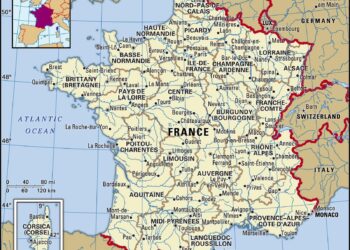In a notable shift that has implications for the LGBTQ+ community, Belgium has revised its travel advice for citizens visiting the United States, with a specific emphasis on individuals who identify as transgender or non-binary. According too a report by VRT, the Belgian government now recommends that travelers from these groups list their “gender at birth” on official documents when navigating U.S. immigration processes. This change comes amid ongoing debates regarding gender identity and recognition both domestically and internationally. As travelers prepare for journeys to the U.S., this updated guidance raises crucial questions about inclusivity, legal recognition, and the personal safety of those who may not conform to customary gender norms. In this article, we will explore the implications of Belgium’s advisory, the broader context of LGBTQ+ rights in travel, and the potential challenges faced by these individuals within the U.S. immigration system.
Belgium Updates US Travel Advice on Gender Identification
In a notable shift in policy, Belgium has updated its travel advice regarding gender identification, notably impacting transgender and non-binary travelers to the United States. The revised guidance now advises individuals to list their ‘gender at birth’ when completing any travel documentation. This change raises concerns over the inclusivity and acknowledgment of an individual’s gender identity,as many may feel uncomfortable adhering to such stipulations. The implications of this guidance could affect travel experiences at various checkpoints, including airport screenings and immigration checks.
Travelers are encouraged to remain informed about the evolving landscape surrounding gender identity and travel policies. Key points to consider include:
- Documentation Requirements: Ensure that all travel documents reflect accurately as per the new guidelines, particularly if you have legally changed your gender.
- Travel Safety: Stay updated on local laws and regulations regarding gender identity in both Belgium and the US to navigate any potential legal challenges.
- Support Networks: Connect with local LGBTQ+ organizations for advice and assistance on travel-related matters.
Understanding the Implications for Transgender and Non-Binary Travelers
The recent change in Belgium’s travel advisory presents significant implications for transgender and non-binary travelers. By requiring individuals to declare their ‘gender at birth’, the policy may inadvertently subject travelers to discrimination, discomfort, or even identity invalidation during their journey. It raises pressing questions about privacy and personal agency, especially for those whose gender identity does not align with the sex assigned at birth. As countries navigate the complexities of gender identity recognition,this policy will likely exacerbate the challenges transgender and non-binary travelers face in securing their right to travel safely and without prejudice.
In light of these developments, it is essential for travelers to prepare themselves for potential hurdles, including the following considerations:
- Documentation Review: Ensure that all travel documents accurately reflect one’s current gender identity to help mitigate confusion.
- Awareness of Local Laws: Research the legal surroundings of the destination country regarding the rights of transgender and non-binary individuals.
- Community Support: Connect with local LGBTQ+ organizations for updated advice and assistance regarding travel safety.
While navigating these requirements may seem daunting, proactive measures can help alleviate some of the associated challenges. Understanding the relevance of one’s identity in the context of travel will be crucial in adapting to this evolving landscape.
The Importance of Listing Gender at Birth in Travel Documentation
In a pivotal move, authorities have emphasized the need for individuals to list their gender at birth in travel documentation. This change is particularly significant for transgender and non-binary persons, who may face challenges when their identity does not align with traditional gender markers. By requiring this facts, officials aim to streamline processes and ensure that legal documents are in accordance with international travel standards. This can help mitigate issues at borders where discrepancies between documents and personal identity might cause confusion or delay.
Moreover, the implications of such a requirement extend beyond mere documentation. It raises critically important questions about the relationship between identity and bureaucratic systems. Individuals are left navigating a complex web of societal and institutional expectations that can frequently enough be at odds with their personal realities. the following points underscore the potential impacts of enforcing birth gender listings:
- increased scrutiny during travel: Travelers may face additional questioning or inspection due to documentation mismatches.
- Psychological considerations: For many, listing gender at birth can be a painful reminder of past identities.
- legal implications: Consistent enforcement could lead to legal challenges concerning individual rights and identity recognition.
Analyzing the Reactions from the LGBTQ+ Community
The recent proclamation from Belgium’s travel advisory, recommending that transgender and non-binary individuals indicate their ‘gender at birth’ on documents for travel to the United States, has sparked significant discourse within the LGBTQ+ community.Many activists and organizations are voicing their concerns over the implications of such a directive,which they argue perpetuates a binary understanding of gender and undermines the identities of those who do not conform to traditional classifications. Key voices in the community emphasize the need for travel regulations that respect and affirm each individual’s self-identified gender, highlighting that forcing individuals to disclose their gender assigned at birth can lead to emotional distress and potential discrimination while traveling.
In response to the barrage of criticism, several LGBTQ+ advocacy groups have mobilized to raise awareness about the potential ramifications of this directive. They have outlined several key points regarding their stance, including:
- Increased Vulnerability: The requirement could place transgender and non-binary travelers at risk of harassment.
- Privacy Concerns: Disclosure of gender at birth may infringe on personal privacy and autonomy.
- Reinforcement of Stereotypes: Such guidelines could reinforce outdated and harmful stereotypes about gender non-conformity.
Legal Context: Gender Recognition and Travel Policies
The recent travel advisory issued by Belgium highlights significant complexities in the legal landscape surrounding gender recognition. In particular, the requirement for transgender and non-binary individuals to list their ‘gender at birth’ presents a challenge that intersects with evolving social attitudes and legal standards. Many countries are increasingly recognizing the rights of individuals to identify with their chosen gender; however, the patchwork of policies and regulations can leave travelers vulnerable, exposing them to potential misunderstandings or discrimination at borders. This situation emphasizes the need for harmonization in international travel policies to better respect an individual’s self-identified gender.
As nations grapple with these legal intricacies, passengers planning to travel to the United States from Belgium must navigate these changes with caution.key considerations include:
- Legal recognition: The divergence in legal recognition of gender identity across various states in the US.
- Documentation: The necessity for consistent identification documents that match the individual’s preferred gender.
- Potential Risks: The risk of being misgendered or facing reluctance from authorities when proper documentation is not presented.
In light of these challenges, discussions continue among policymakers and advocates to create a more inclusive and understanding framework for gender recognition and travel. Public awareness campaigns and legal reforms may help pave the way for systemic change that acknowledges and affirms the identities of all travelers.
Practical Steps for Travelers: How to Navigate the New Guidelines
As travelers prepare to navigate the recent changes in Belgium’s travel guidelines, it’s essential to familiarize themselves with the updated requirements. Anyone identifying as transgender or non-binary will now need to specify their gender at birth when completing travel documentation. This requirement means that travelers should ensure their documentation reflects this information accurately. To streamline the process,consider the following practical steps:
- Verify Documentation: Ensure that all travel documents,including passports and identification cards,reflect the correct gender at birth as required.
- contact Authorities: If there are discrepancies or questions regarding your documentation, reach out in advance to the relevant embassies or consulates.
- Travel with Essentials: Bring supporting documents that might clarify your gender identity, such as medical or legal papers, to avoid potential travel disruptions.
To further assist in understanding the changes, we have created a simple reference table that highlights key distinctions travelers should be aware of:
| Category | Requirement |
|---|---|
| Gender Identity | Travelers must list their gender at birth. |
| Documentation | Ensure accuracy on all travel documents. |
| Supporting Documents | Carry any relevant legal or medical documents as needed. |
By following these steps and staying informed about the changing guidelines, travelers can ensure a smoother journey while respecting the new policy requirements in Belgium.
Resources and Support for Affected Individuals
For individuals who may be affected by Belgium’s recent travel advice, it’s crucial to know that support networks and resources are available to assist in navigating these changes. Local LGBTQ+ organizations and advocacy groups offer guidance on legal and documentation issues that may arise due to the requirement to list ‘gender at birth.’ Some useful resources include:
- Transgender europe (TGEU) – Provides information on transgender rights across Europe.
- ILGA-Europe – A network promoting LGBTQ+ rights within Europe, including support for travelers.
- Local LGBTQ+ Centers – Many cities in Belgium have dedicated centers that offer legal advice, counseling, and community resources.
In addition to these organizations, community support groups play a vital role in providing emotional and social support. Online forums and social media groups can also be beneficial for individuals seeking to connect with others facing similar challenges. Consider accessing:
- Support Hotlines – Many organizations provide 24/7 helplines for confidential assistance.
- Peer Support Groups – Regular meetups and online discussions can foster a sense of community.
- Workshops and Webinars - Educational opportunities focusing on legal rights and advocacy strategies.
Future Considerations for Gender Inclusivity in Travel Regulations
As travel regulations continue to evolve,it is essential for authorities worldwide to reassess their policies to promote inclusivity and respect for all individuals,particularly those who identify as transgender or non-binary. Recent recommendations, such as those issued by belgium regarding the classification of gender at birth, highlight the necessity of considering gender identity in travel documentation. To move forward effectively, stakeholders must focus on several key areas:
- Policy Revisions: Governments should routinely review travel regulations to eliminate outdated practices that disproportionately impact gender-diverse individuals.
- Awareness Campaigns: educational programs targeted at consulates and travel agencies can foster a more inclusive atmosphere for travelers.
- Collaboration with Advocacy groups: Working alongside LGBTQ+ organizations can ensure that the needs and voices of the community are represented in policy-making.
In addition to policy changes, adopting technology-driven solutions can greatly enhance the travel experience for all genders. Implementing systems that allow travelers to select their preferred identity without the constraints of predefined categories could revolutionize the travel process. Consider the following potential solutions:
| Solution | Description |
|---|---|
| Dynamic Gender Options | Allowing travelers to choose from multiple gender identities during booking and check-in processes. |
| Facial Recognition Tools | Utilizing technology that recognizes individuals versus relying solely on gender markers. |
In Conclusion
Belgium’s revised travel advice for the United States introduces a significant guideline for transgender and non-binary individuals seeking to navigate their travel experience more smoothly. By recommending that these travelers list their “gender at birth” on official documents, the Belgian government aims to mitigate potential complications they may face upon entering or exiting the U.S. As the implications of such a policy play out, it underscores the complexities of identity in an increasingly interconnected world. Travelers are urged to stay informed about changes in policies and to advocate for their rights while navigating diverse regulations in international travel. As the discourse on gender identity continues to evolve, the impact of these travel advisories reminds us of the importance of inclusivity and understanding in global mobility.











